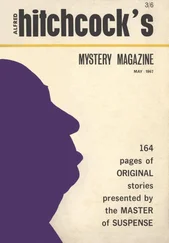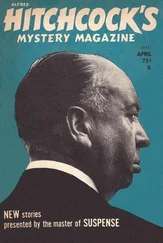He demanded that the sisters address each other by the names of "Alice" and "Dora." If they forgot, he made a scene.
Each day he left the house for an hour or so. He would force Helen to write a check made out to "Cash" and endorse it. With this he would buy food, medicine, cigars. During his brief absences they at least could air out the fetid apartment. And they talked ineffectually of escape. He had possessed himself of all the keys. When he went out, he locked them in. The apartment was on the street level and all the windows were barred. Helen had often complained that the bars made the apartment seem like a prison, never realizing the prophecy of the remark. The idea she had of sawing through them with a nailfile, she dismissed as hopeless melodrama.
Mr. Heavenridge would not allow Helen to deliver her art work to magazines. He forced her to write letters to all the art editors she knew, stating that her telephone had been disconnected because its ringing distracted her and that from now on, she would accept commissions only by mail. Commissions arrived and the old man was a grim taskmaster in seeing that she fulfilled them. When she wrote to the magazines, he read her letters carefully. He even read the instructions to the engravers that she penciled on her drawings, to see if she had inserted some sly appeal for help. When checks came from publishers, Mr. Heavenridge forced Helen to endorse them. He would fold the checks and place them in his wallet. Helen never saw the money. Often the checks were for large sums.
On the first day of his occupancy, the old man had appropriated Marcia's diary. From that he had learned that the man he had seen in the apartment was Paul Carter.
He always brought a newspaper back with him from his shopping tours. During the first week after he moved in, the first or second page of the paper would have an item torn from it. Mr. Heavenridge said the missing items were stories of Carter's murder. He thought it would distress the girls to read too much of it. After the first week, there were apparently no further stories about Carter, for no items were torn from the papers he brought home.
Apparently, the old man had forgotten his intention of renting his own apartment down the hall. From time to time he would visit his old quarters and bring back shoddy pieces of furniture that would crowd the overcrowded apartment even more.
Only at night, when they slept together on a narrow single bed, in a pitch-dark room, did Helen and Marcia have any semblance of privacy. And even then they were afraid to whisper. The fat old man was a hovering presence in their lives. They always fancied he was listening at the crack of their bedroom door.
To Helen, the most abhorrent thing of all was calling him "Daddy." His own daughters had called him that, he said, and he insisted Helen and Marcia do the same. The taste of the word was sour bile in Helen's mouth.
Marcia tried desperately to retreat into the world of fantasy that had always been her haven in the past, but for once it failed her. The presence of the old man bulked too large. When Marcia sought refuge in this peculiar world of her own, Mr. Heavenridge always noticed immediately. He would loom over her threateningly and say, "You're daydreaming, Dora! Don't make Daddy angry! You know what happens when you make Daddy angry, child!"
He supervised their dress and their toilettes. He threw out their wave sets, demanded that they let their hair grow and fix it in a knot at the back of their necks. He would not permit them to use rouge or perfume or nail polish.
It wasn't surprising that Helen's hand was shaky when she held a pen or brush or crayon. Drawings were returned more and more frequently by editors who found them unsatisfactory. She lost several of her best accounts, and the old man raged at her.
As for Marcia, she hardly ate or slept at all. The old man had found her sleeping pills and had thrown them in the garbage, calling her a dope addict.
Marcia grew ill and feverish with flu. Helen begged the old man to call a doctor, but he refused. He forced Marcia to dose herself with salts and aspirin. As she lay helpless and burning with fever, he sat beside her bed by the hour, reading aloud from the Bible.
Marcia recovered. Despite her weakness, the old man drove her to perform her share of household tasks. Helen, he said, must have the time to make a living for all of them with her art work.
In time, Helen found herself moving mechanically, like a puppet manipulated by the fat man's pudgy fingers. She had lost all sense of time, all ambition, all hope. They would never escape, and she resigned herself to that fact. She thought wildly of screaming at passing policemen from the window; then she realized what that would mean for Marcia. She thought, too, of murdering the old man, and when that occurred to her, she realized she had retreated into her younger sister's impossible world of fantasy.
She told herself that she had died the night the old man knocked upon the door. She and her sister had been parties to the awful act of murder and now they were in hell. She seldom spoke to her sister any more. There was no use in recalling the past — if there had ever really been a past. Nothing was real except the old man and his whims and his power over them, which was now complete.
He had been with them more than a month the night that Marcia came into the living room, her face flushed, her eyes unnaturally bright, a queer little smile playing on her pale lips. The old man was sitting in a big chair, munching Limburger and crackers. A cigar was burning on the scarred edge of a maple end-table at his side. Ashes and cracker crumbs littered the floor around him.
Helen roused from her usual lethargy enough to look curiously at her sister. Marcia was carrying a newspaper the old man had brought home from his shopping tour.
"I want to read you something, Daddy-O," Marcia said.
The old fat man almost choked. Cracker crumbs drooled over his beard-spiked chin.
"What did you call me, Dora?" he demanded.
"I called you Daddy-O," Marcia answered. "It's kind of a pet name for a fat old man."
The old man rose from the chair, still spluttering crackers from his mouth. He advanced toward Marcia, his loglike arm raised threateningly.
Marcia laughed at him. "You shouldn't hit me until after I've read you something, Daddy-O," she said. "I might scream for the police and tell them what a dirty old man you are."
The old man stood stock-still and lowered his arm. There was a look of alarm on his face. It was followed by a look of cunning. He backed to his chair and dropped heavily into it.
"You are right, daughter," he said. "It is almost time for the Bible. Read to me."
"Not the Bible, Daddy-O. I want to read you something from the newspaper."
"I've read the paper, child," the old man replied. "I have little interest in worldly news. You and your dear sister and I have a warm little world of our own here. We must keep it to ourselves, sacred to our happy little family."
"I don't think we can any longer, Daddy-O," said Marcia. She unfolded the paper.
She looked at the old man. There was mockery in her smile now.
"This is from the society page, Daddy-O," Marcia said. "I doubt you ever read the society page."
She paused, teasing the old man. He sat perfectly still, staring at her. His cigar dropped from the table and began to scorch the rug. Helen saw it but did not move to pick it up.
Marcia began to read.
Mr. and Mrs. Paul Carter of Rye, N.Y. were among the passengers on the S.S. Constitution which sailed for Europe today. They will make an extended tour of England and the Continent. Mrs. Carter is the former Sylvia Enright. Mr. Carter is vice-president of the Enright Advertising Agency.
Marcia put the paper down and laughed aloud at the old man.
Читать дальше









